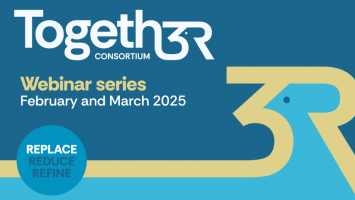
Webinar series: Non-animal approaches across Europe
26.02.2025 14:00 – 15:20
The Swiss 3RCC is part of The Togeth3R Consortium, group of 8 European 3Rs centres collaborating to host webinar series showcasing 3Rs research and innovation across Europe.
Our upcoming webinar series will showcase non-animal approaches in research fields associated with high levels of animal use across four sessions: :
Infection and immunity (26.02.25)
Oncology (05.03.25)
Neuroscience (12.03.25)
Cardiovascular science (19.03.25)
_____________________
Programme:
Infection and immunity: Wednesday 26 February, 14.00 – 15.20 (CET)
This webinar explores the development and application of non-animal approaches in infection and immunity, including organoids to research host-microbe interactions, using human cells in vaccine development and digital twins of autoimmune disease.
Prof Sina Bartfeld – Technische Universität Berlin, Germany: Title TBC.
Dr Rachel Tanner – University of Oxford, UK: A cross-species ex vivo assay for tuberculosis vaccine testing.
Prof Anna Niarakis – University of Toulouse III, Paul Sabatier, Center of Integrative Biology, France: Building a virtual twin of the rheumatic joint.
Oncology: Wednesday 5 March, 14.00 – 15.20 (CET)
This webinar explores the development and application of non-animal approaches in oncology, including organoids to study lung cancer and leukaemia, microphysiological systems and using patient samples to improve translation.
Dr Sanae El Harane – University of Geneva, Switzerland: AirLiwell technology: development and perspectives in oncology replacement.
Dr Deepali Pal – University of Bristol, UK: Patient-derived leukaemia organoids.
Prof John Greenman – University of Hull, UK: Tissue-on-chip models using patient biopsies to study patient response.
Neuroscience: Wednesday 12 March, 14.00 – 15.20 (CET)
This webinar explores the development and application of non-animal approaches in neuroscience, including using human neurons and organoids to better understand and treat Alzheimer’s disease and computational models of neuronal networks.
Prof Ivan Nalvarte – Karolinska Institutet, Sweden: Brain organoids to study Alzheimer’s disease – a comparative approach.
Prof Selina Wray – University College London, UK: Human neuronal models of Alzheimer’s disease for understanding disease mechanisms and developing novel therapies.
Prof Dmitri Rusakov and Dr Leonid Savtchenko – University College London, UK: BRAINCELL, a computational platform to explore in silico realistic 3D brain cells and their interactions.
Cardiovascular science: Wednesday 19 March, 14.00 – 15.20 (CET)
This webinar explores the development and application of non-animal approaches in cardiovascular science, including using human cardiac tissue and stem cells and computational modelling of cardiovascular disease.
Prof Milica Radisic – University of Toronto, Canada/Berlin Institute of Health at Charité, Germany: Advanced heart-on-a-chip models in disease modeling and drug screening.
Prof Chris Denning – University of Nottingham, UK: Title TBC.
Dr Caglar Ozturk – University of Southampton, UK: High fidelity computational approaches to model cardiovascular diseases.
Lieu
Online
Organisé par
Expérimentation animaleentrée libre
Inscription
Date limite d'inscription: 25.02.2025
To register
Infection and immunity (26.02.25):
https://events.teams.microsoft.com/event/a34207f3-90c3-41a0-af44-c37f1e542444@b923ff2a-fc62-485f-972b-b49c3265bf9e
Oncology (05.03.25),
https://events.teams.microsoft.com/event/cad3412c-8868-40ab-b783-817bcf04c183@b923ff2a-fc62-485f-972b-b49c3265bf9e
Neuroscience (12.03.25),
https://events.teams.microsoft.com/event/c75a653a-5cc9-4528-b1a5-3e241bed5996@b923ff2a-fc62-485f-972b-b49c3265bf9e
Cardiovascular science (19.03.25).
https://events.teams.microsoft.com/event/ddda3e06-ab33-486e-b042-cbe08d4eb717@b923ff2a-fc62-485f-972b-b49c3265bf9e

 haut
haut